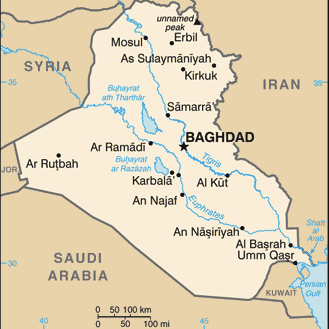The juxtaposition of the new Iraqi Prime Minister’s views, in a BBC interview, on which Arab countries should be bombing other Arab countries produces some pretty amazing (and unsurprising) geopolitical NIMBYism:
Iraqi Prime Minister Haider al-Abadi has told the BBC he “totally” opposes Arab nations joining air strikes against Islamic State in his country.
vs.
Mr Abadi said he had sent a delegation to Damascus to inform its neighbour of Iraq’s request for the coalition to target IS in Syria, saying it was crucial to stop “transient border terrorism”.
Don’t bomb us without permission — bomb them without permission!
 Now, again, it’s not that surprising. I’m sure Prime Minister Abadi doesn’t really want a precedent established that he, the leader of his country, is so weak he must seek help from his neighbors and invite their interference. Moreover, it probably hurts him, as the political head of Iraq’s majority Shia faction, if he welcomes Iraq’s Sunni-ruled neighbors’ armed forces bombing Iraq, even if they’re targeting armed groups in Iraq, and even if those groups happen to be Sunni insurgents this time. (After all, bombing Sunni Iraqis is a job for the Shia-dominated Iraqi Air Force, with as much cruelty and incompetence as possible.)
Now, again, it’s not that surprising. I’m sure Prime Minister Abadi doesn’t really want a precedent established that he, the leader of his country, is so weak he must seek help from his neighbors and invite their interference. Moreover, it probably hurts him, as the political head of Iraq’s majority Shia faction, if he welcomes Iraq’s Sunni-ruled neighbors’ armed forces bombing Iraq, even if they’re targeting armed groups in Iraq, and even if those groups happen to be Sunni insurgents this time. (After all, bombing Sunni Iraqis is a job for the Shia-dominated Iraqi Air Force, with as much cruelty and incompetence as possible.)
In his defense: It’s just generally not a great idea to invite neighbors — especially ones with a tense and sometimes bitter history of rivalry (or even past territorial disputes) — to feel welcome to bomb you. In contrast, it’s probably (somewhat) less objectionable to request air support from halfway around the world. It’s one thing to publicly invite the strongest air power in the world to help you because your own air force is under-equipped and terrible and useless; it’s a very different matter to draw attention to the fact that the surrounding Arab states of Jordan, Saudi Arabia, the UAE, Bahrain, Qatar, and Kuwait (which hasn’t participated so far) all have vastly superior air forces to Iraq’s.
And, to top it off, the recent unilateral airstrikes in Libya by the United Arab Emirates, following up on their Arab League authorized operations in 2011, might also have made Abadi cautious about opening that door now and laying out the welcome mat for future meddling in Iraq, as in Libya.
But telling them to target insurgents in Syria seems to be another matter for Abadi — and one without a whole lot of additional logic, other than that it’s not Iraq, so it’s not his problem. It might also be that he needs to emphasize his “request” for coalition airstrikes in Syria to strengthen the case that the US-led coalition isn’t violating international law by intervening in Syria without permission because it is simply targeting a Syrian-based threat to the Iraqi state. (I’m a little skeptical of that reasoning, given that most people don’t consider it legal during the Vietnam War for the US to have bombed Vietnamese insurgent / North Vietnamese Army supply lines in Laos and Cambodia, even to defend the South Vietnamese government.)
At any rate, the more things change, the more things stay the same — and that includes Gulf-area countries trying to play each other off each other constantly to try to gain tiny edges momentarily.


